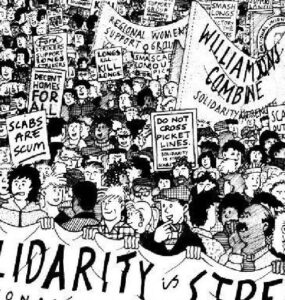 What does it mean to change the world? Where do we start? How do we get masses of people to wake up and rise up? Sometimes it feels impossible. People vote for parties who openly attack their interests. Most of the time only a handful will join protest marches or do anything more militant. The climate is changing, wars are raging the world over, and most people don’t even want to hear about it.
What does it mean to change the world? Where do we start? How do we get masses of people to wake up and rise up? Sometimes it feels impossible. People vote for parties who openly attack their interests. Most of the time only a handful will join protest marches or do anything more militant. The climate is changing, wars are raging the world over, and most people don’t even want to hear about it.
But that isn’t the whole story…
People do know about daily life. No amount of facebook ads and news propaganda can convince us that rent is inexpensive, that our streets are clean, or that our work is fullfilling. Women know that sexism at work exists, people of colour know they face racism. Even if people put it out of mind to get through the day, it’s always there just beneath the surface. So that’s where we start. We talk about the things people can see right in front of them, and what could be done about it. Then we have something to build on. When it comes to daily life half the job is done already – people know that there are problems. All that’s left is to get them together, and convince them something can be done about it.
Aiming High, Starting Small
What does this have to do with the bigger picture? Well, something happens to us when we stand up for ourselves. We get more sympathetic to other people. We get more confident. And we start to see things in a new light – that maybe, just maybe, they could be different. This is the kind of consciousness we need to encourage. It happens when we feel a genuine hope that something could change. When we stop thinking that we’re powerless. And when we realise our best chance to improve things, is to band together with other working class people, not against each other fighting for the scraps. Instead of blaming other workers for our problems, such as migrants, we can blame the rich bosses and landlords instead. When we support each other, acting in solidarity, we have a force that will change the world.
Mass rebellion does happen, but we cant just sit around waiting for the next one. All of the small victories we win, all the self-education and experience in organising, builds towards it. Small-scale organising teaches us to show solidarity with fights that dont directly effect us, and gives us a base to work from when the chance for mass organisation comes around. So we start very small, with problems we can sort using direct action from just a few people. For example tennants demanding repairs and stolen deposits back from landlords, or workers demanding their unpaid wages from bosses. It’s about setting an example – when people see that it works and that it can help them, more and more will get involved. Direct action means doing things ourselves, without any politician or legal expert acting as middle manager. It can be anything from a community litter-pick, to picketing a landlord’s office, to an all-out strike.
Why direct action?
- It gives us a sense of our own power. It increases our self reliance and confidence as a class, instead of our dependence on bosses’ and politicians’ good will
- Everyone involved has to get stuck in – it’s naturally democratic
- It’s repeatable. To win bigger demands, all we have to do is scale up. Involve more people, or be more militant. There’s a natural progression from taking action over something small and personal, to taking action in solidarity with others, to taking action to change our whole society. Compare that to using laws and regulations – there’s only so far they can go and they depend on specialist expertise. Doing things that way isn’t something just anyone can copy for themselves.
- It’s makes our relationship to authority figures clear, confronting them directly
- Direct action is good because it works! The legal and political systems are stacked against us. Taking matters into our hands is often the fastest and easiest way to get things done